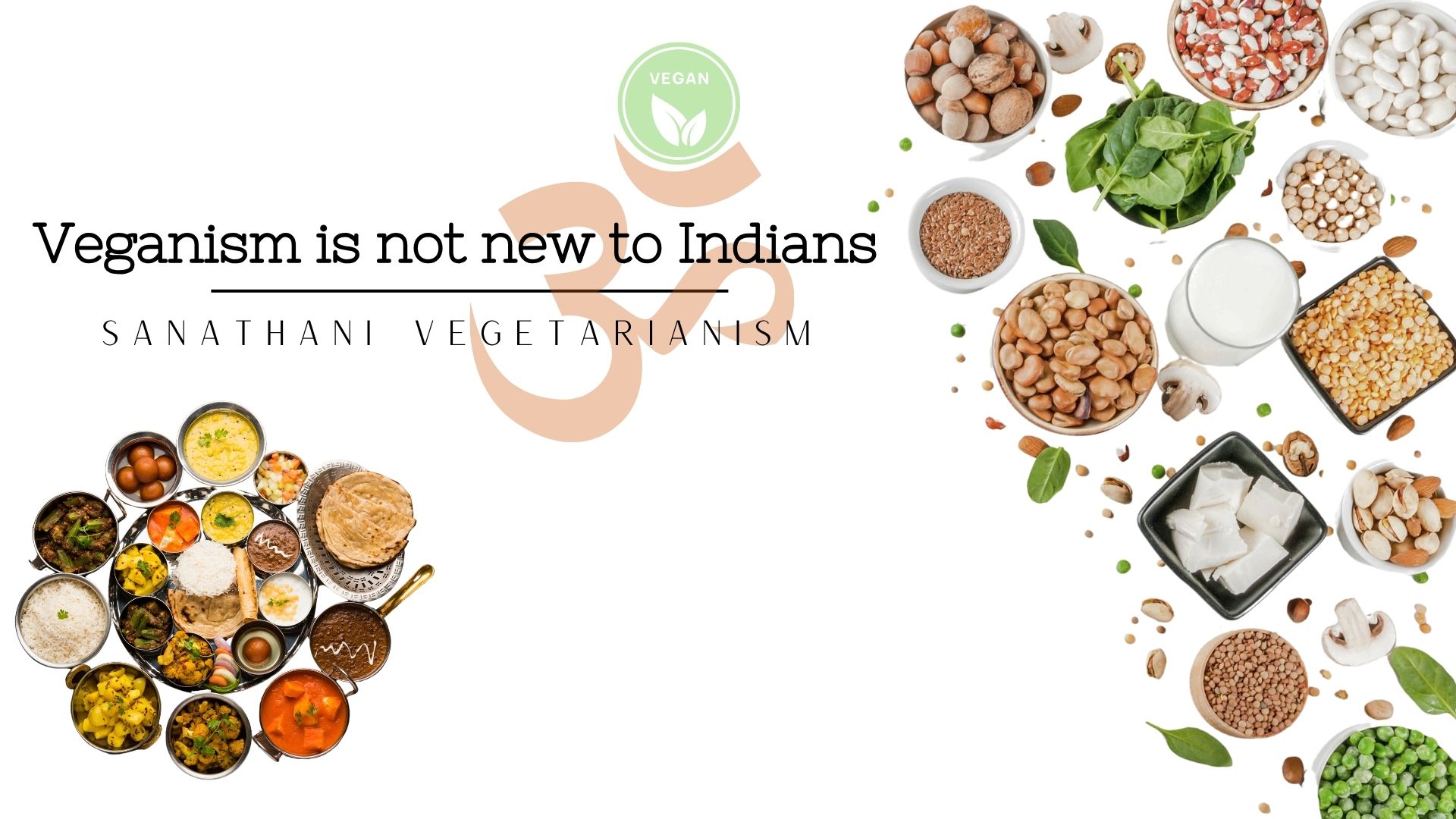
Being a Vegetarian Sanathani – Key to a Sustainable Future
Vegetarianism holds significant importance within Hinduism or the Sanathani way of life, although it's important to note that not all Hindus are strict vegetarians. Here's an overview of the relationship between Hinduism and vegetarianism:
1. Religious Beliefs: Many Hindus practice vegetarianism as an expression of their religious and spiritual beliefs. Hinduism encourages compassion and non-violence (ahimsa), and adherents believe in treating all living beings with respect. Avoiding the consumption of animal flesh aligns with these principles.
2. Karma and Reincarnation: Hinduism teaches the concept of karma and reincarnation. Some Hindus believe that consuming the flesh of animals can accumulate negative karma, potentially affecting their future incarnations.
3. Religious Texts: Hindu scriptures, such as the Bhagavad Gita and Manusmriti, contain passages that endorse vegetarianism and emphasize the importance of non-violence (Mahatma Gandhi’s core value). These texts have influenced many Hindus to adopt a vegetarian lifestyle.
4. Deity Worship: Hindus often worship deities, some of whom are associated with vegetarianism. For example, Lord Krishna is depicted as a vegetarian, and his stories often promote the consumption of plant-based foods.
5. Fasting and Vegetarianism: Many Hindu festivals and religious observances involve fasting, and during these periods, adherents typically abstain from consuming meat and sometimes even dairy products.
6. Variation Among Practices: It's essential to recognize that practices within Hinduism can vary significantly. While some Hindus are strict vegetarians, others may consume meat on occasion. Regional customs, personal beliefs, and family traditions can influence dietary choices.
7. Modern Influences: In modern times, there has been a resurgence of interest in vegetarianism and veganism among Hindus, often for health and environmental reasons, in addition to religious considerations.
In summary, vegetarianism is deeply rooted in Hinduism, driven by religious, ethical, and cultural factors. However, adherence to a vegetarian diet varies among individuals and regions within the diverse Hindu community.
There are several potential benefits of vegetarianism:
1. Healthier Diet: Vegetarian diets tend to be rich in fruits, vegetables, whole grains, and legumes, which can lead to lower risks of heart disease, high blood pressure, and certain cancers.
2. Weight Management: Vegetarians often have lower calorie intake and lower body mass index (BMI), which can help with weight control.
3. Environmental Impact: Reduced meat consumption can lower greenhouse gas emissions, reduce deforestation, and decrease water usage, contributing to environmental sustainability. The beef industry is a significant contributor to methane emissions, primarily due to enteric fermentation in cattle and manure management. Enteric fermentation refers to the digestive process in cattle that produces methane as a byproduct. Manure management practices, such as storing and treating animal waste, can also release methane.
Here’s a rough estimate:
Enteric Fermentation: Cattle are known to be a major source of methane emissions. Globally, it was estimated that the beef industry contributed to approximately 14-18% of global methane emissions from enteric fermentation in livestock as of 2021.
4. Animal Welfare: Vegetarianism aligns with concerns about animal welfare by reducing the demand for meat production.
5. Ethical and Moral Reasons: Some individuals choose vegetarianism due to ethical or religious beliefs that oppose the killing of animals for food.
6. Reduced Risk of Chronic Diseases: Vegetarian diets are associated with a reduced risk of chronic diseases like type 2 diabetes and certain types of cancer.
7. Digestive Health: High-fiber vegetarian diets can promote good digestive health and prevent constipation.
8. Potential Cost Savings: Meat can be expensive, so a vegetarian diet might be more budget-friendly.
It’s important to note that the benefits of vegetarianism can vary depending on individual choices and dietary habits. Consulting with a healthcare professional or nutritionist can help ensure a well-balanced vegetarian diet.
A sustainable future can be promoted through vegetarian diets for several reasons:
1. Reduced Greenhouse Gas Emissions: Plant-based diets typically have a lower carbon footprint compared to diets high in animal products. Raising livestock for meat and dairy production generates significant greenhouse gas emissions, contributing to climate change. Shifting towards vegetarian diets can help reduce these emissions.
2. Conservation of Resources: Producing plant-based foods generally requires fewer resources, such as land, water, and energy, compared to raising animals for meat. This conservation of resources can contribute to long-term sustainability.
3. Preservation of Biodiversity: Land used for animal agriculture often leads to deforestation and habitat destruction. Adopting vegetarian diets can help preserve natural habitats and protect biodiversity.
4. Water Conservation: The water footprint of plant-based foods is typically lower than that of animal products. Choosing vegetarian options can contribute to the conservation of water resources, especially in regions facing water scarcity.
5. Reduced Pollution: Livestock farming generates pollution from manure and other byproducts. Reducing meat consumption can help mitigate water and soil pollution.
6. Efficient Land Use: Vegetarian diets make more efficient use of arable land. Instead of using land to produce animal feed, which requires larger areas, that land can be used to grow crops directly for human consumption.
7. Health Benefits: Plant-based diets can promote health and reduce the burden on healthcare systems, contributing to a more sustainable healthcare future.
8. Food Security: A shift towards plant-based diets can help address global food security challenges by using resources more efficiently to feed a growing population.
To promote a sustainable future through vegetarian diets, individuals, communities, and governments can take various actions, including:
Education and Awareness: Raise awareness about the environmental and health benefits of vegetarian diets.
Policy Support: Implement policies that encourage sustainable agriculture and dietary choices.
Research and Innovation: Invest in research and innovation to develop plant-based alternatives and sustainable farming practices.
Cultural and Culinary Promotion: Promote diverse and delicious vegetarian cuisine to make plant-based diets more appealing.
Community Initiatives: Support local and community-based efforts to promote sustainable food systems.
By embracing vegetarian diets and making environmentally conscious food choices, we can contribute to a more sustainable and resilient future for our planet. The secret our ancient and forefathers knew and thus made it one of the practices of the Sanathani Way of Life.
NEXT ARTICLE